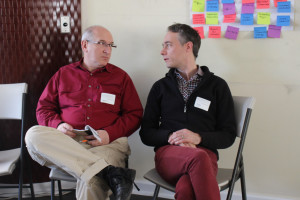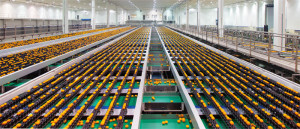Last weekend, I spent the majority of Saturday at an unconference, Cooperation 2015. Three of us – Steve Ediger, Jean Russell, and I – had spent a few months been planning this event, organized around Michel Bauwens‘ visit to Chicago.
The theme of the event was to connect people and ideas across Chicago in the “p2p” movement. What is peer-to-peer? You can read Bauwens’ definition, or my own simplified summary here:
Peer-to-peer is an approach to people organizing themselves based on some combination of:
- Removing intermediaries
- Enabling full participation
- Open knowledge and sharing
- Fair distribution of power
- Equality of ownership or membership
- Dedication to nurturing the commons
Here in Chicago, there are examples of p2p already emerging. About 40 attendees from a variety of backgrounds and industries shared their experiences, knowledge, and hopes for the future. The Dill Pickle Food Co-op was in attendance, along with the Mutual Aid Network, and our generous host, the Institute of Cultural Affairs. Throughout the day, we discussed open cooperatives, social cooperatives, open value accounting, time banking, coworking spaces, participatory budgeting, chamber of the commons, open design and manufacturing, WIKISPEED, FairCoop, mutualization of independent workers, commons based reciprocity licenses, and much more.
True Sharing
Many people (especially investors) are praising the development of the sharing economy. But some sharing economy companies are extracting value rather than distributing it. The peer-to-peer movement provokes us to pause and ask the following question:
Who is ultimately benefiting from my time, money, and knowledge?
The difference between a cooperative, and platform capitalism is significant. For example, the citrus farming cooperative “Sunkist acts on behalf of its farmer members.” When I buy a Sunkist orange, I am more directly helping the people who grow the oranges. Through a CSA I could remove another intermediary – the grocer. In this case, peer-to-peer would be farmer-to-eater.
If I buy an orange from a big box grocer, which sources the fruit from a corporate producer, I am supporting at least two sets of shareholders. Though we are starting to see a shift in who companies ultimately choose to serve, the dumbest idea in the world still lives on – that companies exist to maximize shareholder value. The low price I may pay is at the expense of the farmer or grove worker. When I pay for efficiency, I sacrifice my relationship with the earth and the farmer. I’m more removed from my food, and the people working with the land suffer.
Peer-to-peer empowers more people. It also brings us closer together as we connect to each other, often without the comfort of hierarchical relationships. Openly negotiating roles and exchanges of value may feel “messy,” but it reveals our interdependence and helps us see more clearly the contributions of everyone.
There are examples of peer-to-peer become more significant in lending, banking, food, journalism, technology, and governance. Together, Buffer, Semco, Morning Star, Valve, Zappos, Supercell, stretch across three continents, employ 100,000+ people, and bring in more than $20 billion per year. What do they have in common? They all have transitioned to alternative governance models. Whether it’s going to a boss-less work environment, or organizing a workers’ cooperative, peer governance can really work.
After five days of Michel sleeping in our guest room and an inspiring unconference, what do I take away?
Optimism for the Future
By adopting a peer-to-peer perspective, we can bypass some of the burdens of living in a world of broken systems. Otto Scharmer refers to these as divides – ecological, social, and spiritual/cultural – that lead to systemic disconnects.
Rather than fighting the system, we can connect to each other and create our own structures that are better suited to our needs. As Buckminster Fuller said,
“You never change something by fighting the existing reality. To change something, build a new model that makes the existing model obsolete.”
There’s no need to wait. Peer-to-peer is open and free.
The Value of Perspective
We can view peer-to-peer as a model, but I also prefer to also see it as a perspective. In this way, we can build mutually beneficial relationships in the ethical economy, and we can ask questions in any arena. The peer-to-peer questions for me are:
- Is value being fairly distributed?
- Is power being fairly distributed?
- Are all the stakeholders being considered?
- What can be shared freely and openly?
I can ask these questions for my own company, community, and whenever I have a need or something to offer. Fair does not always mean equal, but it’s always a question worth asking.
For the last question, I’m pondering what it is that I want to contribute to the commons. I’ll keep you posted.
We closed the conference with another Otto Scharmer quote:
“The quality of results produced by any system depends on the quality of the awareness from which people in the system operate.”
I’m thrilled with how much my awareness grew in the last week, and looking forward to connecting with others who can amplify what we are doing, learning, and dreaming of together.


